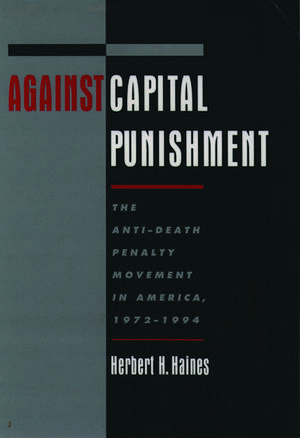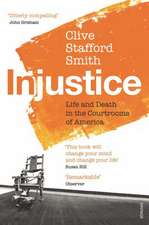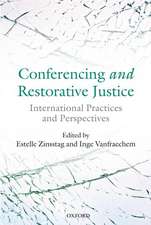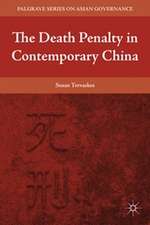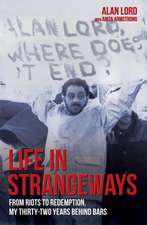Against Capital Punishment: The Anti-Death Penalty Movement in America 1972-1994
Autor Herbert H. Hainesen Limba Engleză Hardback – 20 iun 1996
| Toate formatele și edițiile | Preț | Express |
|---|---|---|
| Paperback (1) | 295.80 lei 31-37 zile | |
| Oxford University Press – 30 sep 1999 | 295.80 lei 31-37 zile | |
| Hardback (1) | 504.66 lei 31-37 zile | |
| Oxford University Press – 20 iun 1996 | 504.66 lei 31-37 zile |
Preț: 504.66 lei
Preț vechi: 722.78 lei
-30% Nou
Puncte Express: 757
Preț estimativ în valută:
96.56€ • 101.09$ • 79.90£
96.56€ • 101.09$ • 79.90£
Carte tipărită la comandă
Livrare economică 26 martie-01 aprilie
Preluare comenzi: 021 569.72.76
Specificații
ISBN-13: 9780195088380
ISBN-10: 0195088387
Pagini: 272
Ilustrații: tables
Dimensiuni: 242 x 165 x 25 mm
Greutate: 0.51 kg
Editura: Oxford University Press
Colecția OUP USA
Locul publicării:New York, United States
ISBN-10: 0195088387
Pagini: 272
Ilustrații: tables
Dimensiuni: 242 x 165 x 25 mm
Greutate: 0.51 kg
Editura: Oxford University Press
Colecția OUP USA
Locul publicării:New York, United States
Recenzii
Yost...has written a brilliant analysis of philosophical arguments for and against the death penalty...This is a seminal, comprehensive treatment of the capital punishment...Essential.
Benjamin S. Yost has written a meticulously researched and tightly argued treatment of the morality of executionYost's book is the most powerful treatment of the procedural argument against execution in the scholarly literature. Its intricate arguments richly repay close study. In light of the injustice of capital punishment, we can only hope that Yost's arguments will serve as potent intellectual ammunition for the righteous citizens fighting tirelessly for abolition. I recommend the book wholeheartedly.
Drawing on a variety of methods, data, and theoretical frameworks, Professor Haines skillfully crafts a comprehensive, up-to-date analysis of the dynamics of the movement to abolish the death penalty in the United States. It is scholarly yet engaging, critical yet sympathetic, and topical yet important. Social movement scholars, criminologists, activists, and other observers will find this first extensive account of anti-death penalty activism since the ten-year moratorium on executions ended captivating and provocative.
Herb Haines tells the compelling recent story of one of the nation's oldest social movements. His tale picks up after organized opposition to the death penalty nearly succeeded in seeing capital punishment abolished in 1972, and it follows the movement's change of direction as hope faded that the U.S. Supreme Court would deliver on its promise to keep the death penalty free of arbitrariness and racial bias, or do away with it. Haines' book presents a uniquely critical but sympathetic appraisal of where the anti-death penalty movement now stands, and what directions it should take.
Mr. Haines' book is a clearly written and well-informed account of the struggles against the death penalty in America over the last two decades. Reading about the passions and commitment of those opposing executions is bound to give pause to even the closest friends of the executioner.
The most important theoretical task in current social movement theory is the integration of organizational and culturalist approaches to movement dynamics. Haines provides us with a model of theoretical syncretism applied to an important empirical case. He makes both the movement's successes and its failures understandable. Against Capital Punishment will no doubt become a standard on social movement bibliographies.
Benjamin S. Yost has written a meticulously researched and tightly argued treatment of the morality of executionYost's book is the most powerful treatment of the procedural argument against execution in the scholarly literature. Its intricate arguments richly repay close study. In light of the injustice of capital punishment, we can only hope that Yost's arguments will serve as potent intellectual ammunition for the righteous citizens fighting tirelessly for abolition. I recommend the book wholeheartedly.
Drawing on a variety of methods, data, and theoretical frameworks, Professor Haines skillfully crafts a comprehensive, up-to-date analysis of the dynamics of the movement to abolish the death penalty in the United States. It is scholarly yet engaging, critical yet sympathetic, and topical yet important. Social movement scholars, criminologists, activists, and other observers will find this first extensive account of anti-death penalty activism since the ten-year moratorium on executions ended captivating and provocative.
Herb Haines tells the compelling recent story of one of the nation's oldest social movements. His tale picks up after organized opposition to the death penalty nearly succeeded in seeing capital punishment abolished in 1972, and it follows the movement's change of direction as hope faded that the U.S. Supreme Court would deliver on its promise to keep the death penalty free of arbitrariness and racial bias, or do away with it. Haines' book presents a uniquely critical but sympathetic appraisal of where the anti-death penalty movement now stands, and what directions it should take.
Mr. Haines' book is a clearly written and well-informed account of the struggles against the death penalty in America over the last two decades. Reading about the passions and commitment of those opposing executions is bound to give pause to even the closest friends of the executioner.
The most important theoretical task in current social movement theory is the integration of organizational and culturalist approaches to movement dynamics. Haines provides us with a model of theoretical syncretism applied to an important empirical case. He makes both the movement's successes and its failures understandable. Against Capital Punishment will no doubt become a standard on social movement bibliographies.
Notă biografică
Herbert H. Haines is Associate Professor of Sociology at the State University of New York at Cortland. He is the author of Black Radicals and the Civil Rights Mainstream, 1954-1970 (1988), which was selected as an Outstanding Book by the Gustavus Myers Center for the Study of Human Rights in the United States.
